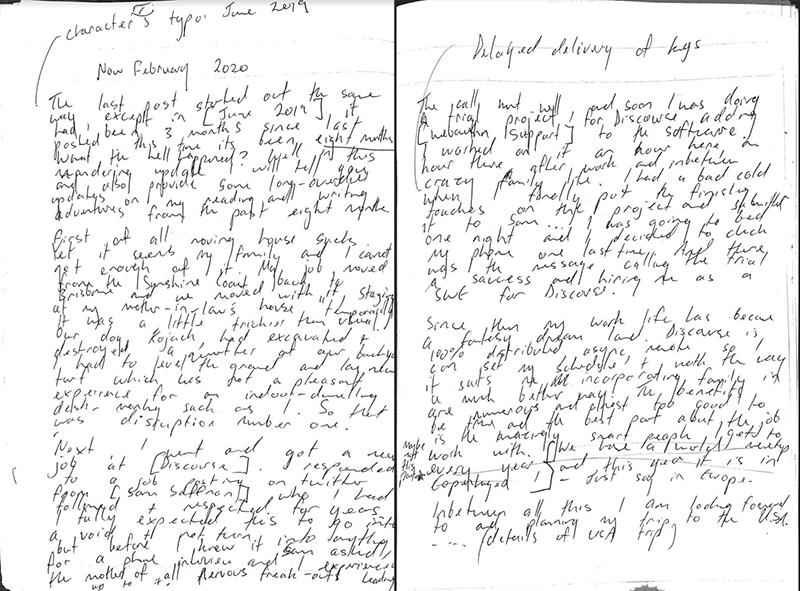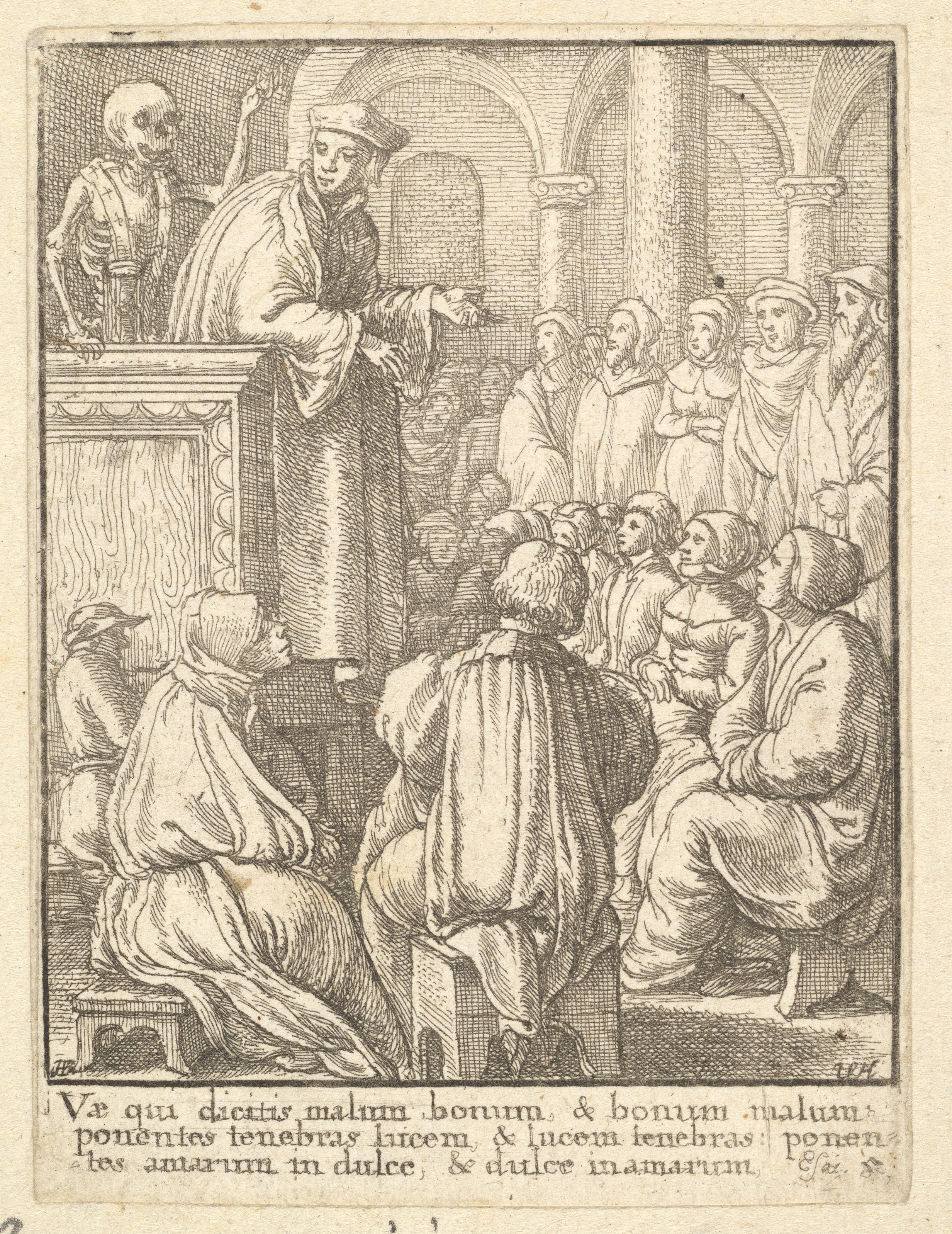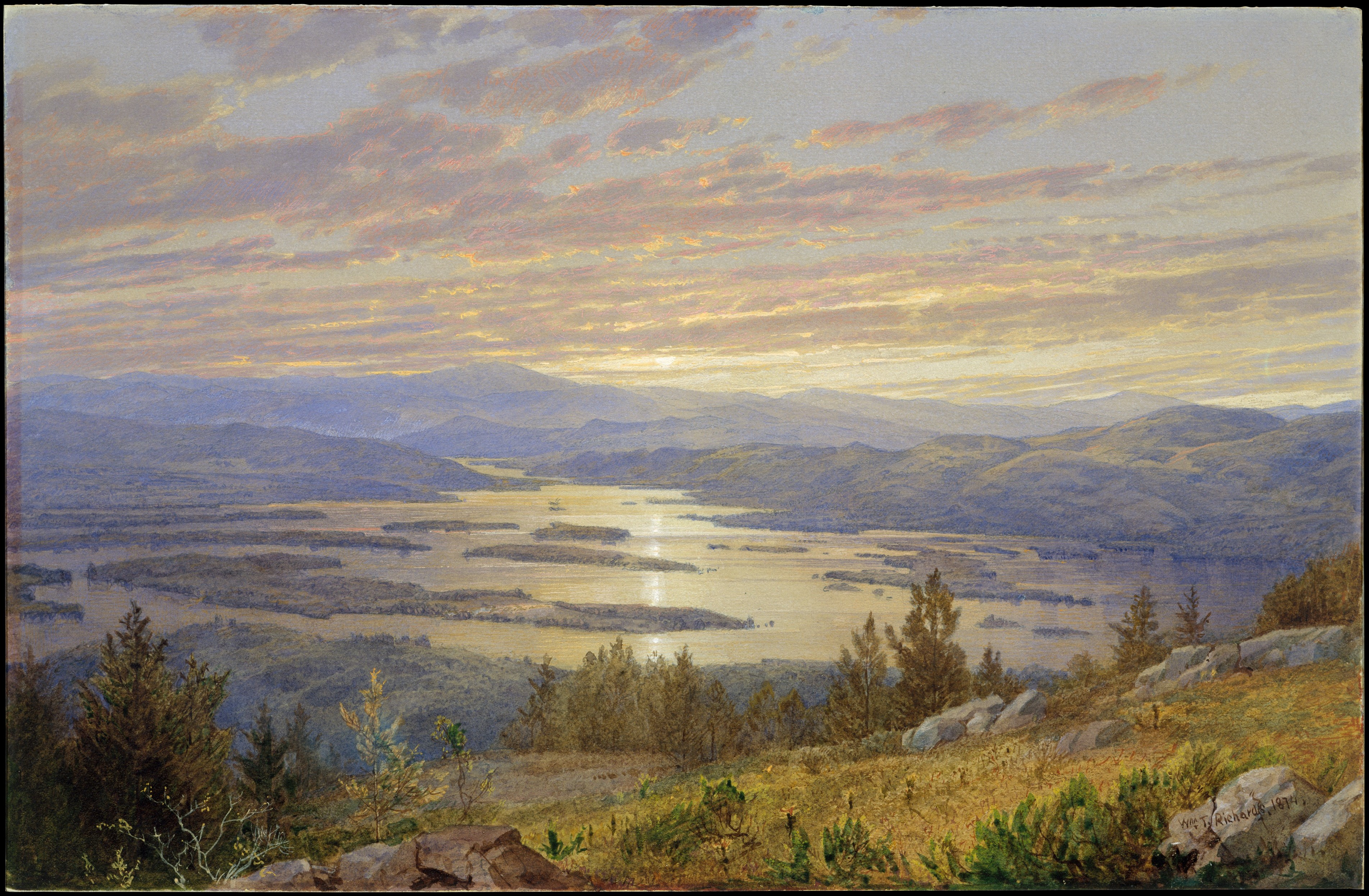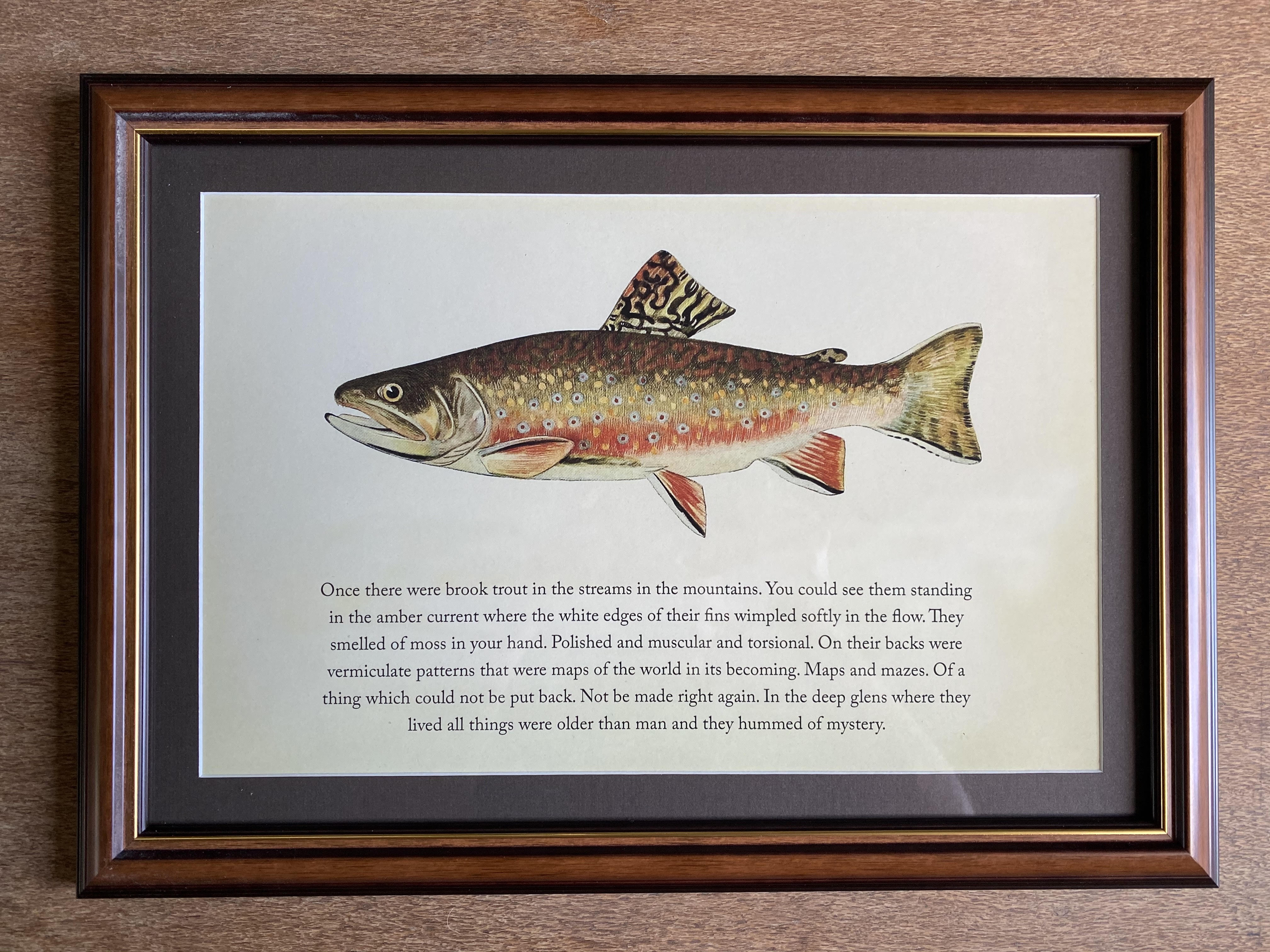Proclamation
I have revised history in this post. I am now a revisionist. I put the newspaper clipping into the furnace. You never saw anything about weekly updates.
Why…How?
It all started with the Now pages. Good-intentioned, I wanted these updates to be a window into my writing process and my progress with my novels and other projects. That didn’t go so well. The problem wasn’t the content – at least I don’t think. I updated. I talked about what I was doing. But the gaps between the posts made these updates rather large, and thus a pain in the arse to write. Even now I have the makings of a “Now February 2020” post partially written longhand, pictured below if you care to strain your eyes to read my scratchings. I wrote this in February in the playground in Indooroopilly shopping centre while my sons played. Abandoned it was, as was all hope when ye entered here. I think what I want to do is smaller posts, that are easier to write and easier to read. Why? Because sometimes writing is being on a gigantic hamster wheel, and it is difficult to see wins and progress when you are in the trenches.

There a few inspirations on this new format I am going to run with. First of all, I’ve been enjoying Robin Sloan’s blog immensely, specifically his “Perils of the Overworld” game development project. An excellent example is a post titled “Week 4, Ladder of Abstraction”. Here Robin talks about the eponymous Ladder, and quotes Roy Peter Clark’s book Writing Tools (which I purchased after Robin recommended it here). Robin’s blog is full of juicy morsels of information, quotes, artwork, and curiosities like the one below. This is what I want to emulate in my format.
Good writers move up and down a ladder of language. At the bottom are bloody knives and rosary beads, wedding rings and baseball cards. At the top are words that reach for a higher meaning, words like freedom and literacy. Beware of the middle, the rungs of the ladder where bureaucracy and technocracy lurk. Halfway up, teachers are referred to as full-time equivalents and school lessons are called instructional units.
The other format guide I am drawing from is the way I write my weekly updates at work. I work as a software engineer at Discourse now, a fully remote asynchronous team. Each of my colleagues and I have a weekly update topic where we write every Friday about the bugs we fixed, features we worked on, and people we collaborated with. In my case I’ve been adding in some slice of life updates from my personal life as well. There is a huge good feeling associated with seeing all the work I’ve done during the week laid bare; it motivates me to do more. These updates are in a dot point format, and as much as possible these updates, which I call Dispatches, will stick to dot points or small paragraphs and sentences as much as possible. My proclamation will ring out through the land!
 Preacher, from the Dance of Death by Wenceslaus Hollar
Preacher, from the Dance of Death by Wenceslaus Hollar
The Actual Update
Look, I’m not going to reach back months to figure out what I’ve done since the last “Now” post, I feel like that would be against the spirit of what I am trying to achieve here (read: a cop-out for my laziness). So I’ll just focus on the last week-ish of writing, reading, my thoughts on things, and inspirations. I spent a good chunk of the past few days updating this blog, and I am pleased with its design and extra functionality and pages now.
I’ve been trying not to write in the passive voice so much. I wrote the sentence before this one like “A good chunk of the past few days was spent…” at first before correcting myself. This is a trap I fall into constantly. Though happily, I find I am much more aware of this these days.
I have been playing a lot of Total War: Warhammer 1 and remembering why I fell in love with the lore of Warhammer Fantasy when I used to play it as a teenager. Yes, call me a nerd, you will not be wrong. You are welcome to it. The fantasy setting is rich, the aesthetic of the different races is perfect, and the world is dark and perilous. I’ve been playing a campaign as the Vampire Counts and I am writing down things that stand out as they come to me. All the undead are making me want to write more of The Marrow King Saga, the fantasy epic I have simmering in the dim reaches of my subconcious. A lot of ideas are swirling around in my brain, mostly related to skeletons and minor and major necromancy.
I opened up my draft of Bottom Feeders and tinkered with it a little again, but didn’t change much. The more I read the first quarter of the book, the more I want to completely rewrite those chapters. My voice has changed a lot, as has my skill. I feel like the second half has some great moments, there are still chapters I am proud of. I am wondering if I should just shelve my first novel, give it up as a learning experience, and focus my efforts instead on The Thaw and finishing that. Editing ain’t fun, man.
On The Thaw, I wrote up almost ten pages of longhand that I had accumulated. This always takes me longer than I think it will. I usually edit while I type up my longhand, making the prose better as I go, but I was finding that I wasn’t making things as good as I could. In Robin Sloan’s words:
I was bogged down in “this, then that.”
Partway through, I started reading Robin’s blog, and especially his Ladder article mentioned above, as well as The Gunslinger. These sources of inspiration really moved me, and got the creative juices flowing. I am trying much harder to add sparkle, magic, whatever you want to call it, to make my scenes pop. I also watched a series of videos that helped me do some good work on clarifying my characters’ wants, needs, and motivations:
I am now up to almost fifty-thousand words for The Thaw. I am tempted to call this a third-way mark – I have a feeling this book will be much longer than Bottom Feeders, though at the same time I kind of dread this outcome with how long it’s taken me to edit that book. My “Gardeners”, the characters which left the safety of their island in Arkansas to head to Colorado, are now passing through Pine Bluff. This is the hometown of my protagonist, Sam, and this is where the end of the world started for him, and there are many markers and triggers for long repressed memories. Like his old truck, found right where he left it, smashed into a group of police cruisers outside the Jefferson County Sheriff’s Office. Psychologically, it is a huge strain on his mind. An excerpt, if you please:
Being in Pine Bluff was taking a toll on him. It had all started here for Sam. Visions flashed through his mind, clear as the day they had happened, as they had when he saw his truck. Smoke billowing from downtown. The man he slammed into with his car reaching out to try him bite him at the side of the road. Deputies torn to pieces by a vicious mob of the dead. And his wife…blood flowing from the gaping wound in her neck, staining her favourite dress, destroying it. The gurgling sound she made, not able to speak to say goodbye. The feeling of the shovel in his hand when he caved in his next-door neighbour’s head to save Sarah. The same shovel jolting his arm as he dug Michelle’s grave in the grey light of early morning. The hopeless noise of static on the radio at night while Sarah slept, as he flicked between the stations hoping to hear the president, searching for someone, anyone, to tell him what the hell he was supposed to do.
This is quite a long chapter, though I am enjoying it. Soon we will meet a new character, held captive in the abandoned Pine Bluff Golden Lions football stadium by a ruthless band of raiders. I don’t know who this new character is yet – I know they will reveal themselves when the time comes. Once we move out of this city, I am looking forward to writing more descriptions of the natural land these characters pass through. I need to keep my imagination firing on all cylinders, and banish the “this, then that” mindset.
 Lake Squam from Red Hill, by William Trost Richards
Lake Squam from Red Hill, by William Trost Richards
I started reading the Dark Tower series by Stephen King. The Gunslinger absolutely blew me away. The writing is familiar, and at the same time completely different from any other King book I have read. The language and the worldbuilding was so rich and descriptive. There were so many well-written and captivating moments; the doomed town of Tull, Brown and Zoltan, the mountains and the Oracle, the fall of Gilead, and the long dark tunnel brimming with Slow Mutants. I loved this book so much. The novel is small, so the whole story is stuck in my head now. I will be referring back to this book a lot, as a grand example of how to nail imagery and atmosphere.
Finally, I want to talk about some excellent resources I have found. The assets in this post are from the Met Museum’s Open Access collection, which is a huge collection of public domain assets that can be used for anything. There is a lot of gorgeous artwork there, I love scenes and landscapes that inspire me in my writing:
Similarly, the Biodiversity Heritage Library contains a huge collection of nature illustrations, also high resolution and public domain. I used this library to find an image of a Brook Trout, which I used for a framed print with my favourite quote from any novel. I even used an image from here for my 404 page, go ahead, try it out!
And the framed fish, with quote, which is the final passage from The Road by Cormac McCarthy:
 The Road, by Cormac McCarthy
The Road, by Cormac McCarthy
Once there were brook trout in the streams in the mountains. You could see them standing in the amber current where the white edges of their fins wimpled softly in the flow. They smelled of moss in your hand. Polished and muscular and torsional. On their backs were vermiculate patterns that were maps of the world in its becoming. Maps and mazes. Of a thing which could not be put back. Not be made right again. In the deep glens where they lived all things were older than man and they hummed of mystery.
Scrolls referencing this scroll
This scroll stands alone. It was one of precious few brought across the sea when the dawnfolk fled the heretics in Revana. Treasure it.